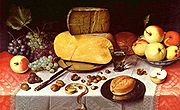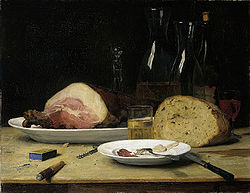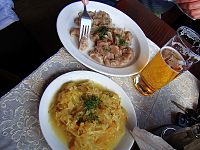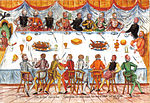- Meal
-
- For the coarsely ground flour, see flour.
Part of a series on Meals 
Common meals Breakfast · Brunch · Lunch · Tea · Dinner · Supper Components & courses Amuse-bouche · Appetizer · Cheese · Cocktails · Dessert · Drink · Entrée · Entremet · Fruit · Main course · Nuts · Salad · Side dish Related concepts Banquet · Buffet · Cuisine · Eating · Etiquette · Food · Global cuisines · Outline of cuisines · Snack A meal is an instance of eating, specifically one that takes place at a specific time and includes specific, prepared food.
Meals occur primarily at homes, restaurants, and cafeterias, but may occur anywhere. Regular meals occur on a daily basis, typically several times a day. Special meals are usually held in conjunction with such occasions as birthdays, weddings, anniversaries, and holidays.
A meal is different from a snack in that meals are larger, more varied, and more filling, while snacks are more likely to be small, high-calorie affairs; however, any food eaten in small amounts at an unscheduled time can be classified as a snack.
A picnic is an outdoor meal where one brings one's food, such as a sandwich or a prepared meal (sometimes in a picnic basket). It often takes place in a natural or recreative area, such as a park, forest, beach, or grassy lawn. On long drives a picnic may take place at a road-side stop such as a rest area.
A banquet is a large, often formal, and elaborate meal with many guests and dishes.
Contents
A multi-course meal
Most Western-world multicourse meals follow a standard sequence, influenced by traditional French haute cuisine. Each course is supposed to be designed with a particular size and genre that befits its place in the sequence. There are variations depending on location and custom. The following is a common sequence for multi-course meals:
- The meal begins with an entrée, a small serving that usually does include red meat.l. It is sometimes referred to as a soup course as soups, bisques and consommés are popular entreés. In Italian custom, antipasto is served, usually finger food which does not contain pasta or any starch. In the United States the term appetizer is usually used in place of entrée as entrée is used to refer to the main course.
- This may be followed by a variety of dishes, including a possible fish course or other relevés (lighter courses), each with some kind of vegetable. The number and size of these intermittent courses is entirely dependent on local custom.
- Following these is the main course or central part of the meal. This is the most important course and is usually a larger portion than all others. The main course is called an entrée in the United States.
- Next comes the salad course, although "salad" may often refer to a cooked vegetable, rather than the greens most people associate with the word. According to The Joy of Cooking, greens serve "garnish duty only" in a salad course. Note that in the United States, Canada, Great Britain and parts of Europe, the salad course (usually a green salad) is served at some point before the main course. Sometimes, the salad also accompanies the cheese course.
- The meal will often culminate with a dessert, either hot or cold, sometimes followed with a final serving of hot or cold fruit and accompanied by a suitable dessert wine.
- The meal may carry on with a cheese selection, accompanied by an appropriate selection of wine. In many countries cheeses will be served before the meal as an appetizer, and in the United States often between the main course and dessert, just like in Western European countries. Nuts are also a popular after-meal selection (thus the common saying "from soup to nuts," meaning from beginning to end).
Sorbet or other palate cleansers might be served between courses.
Before the meal, a host might serve a selection of appetizers or hors d'œuvre with appropriate wine or cocktails, and after the meal, a host might serve snacks, sweets such as chocolate, coffee, and after-dinner drinks (cognac, brandy, liqueur, or similar). These are not considered courses in and of themselves.
A meal may also begin with an amuse-bouche. An amuse-bouche, also called an amuse-gueule, is a tiny bite-sized morsel served before the hors d'œuvre or first course of a meal. These, often accompanied by a proper complementing wine, are served as an excitement of taste buds to both prepare the guest for the meal and to offer a glimpse into the chef's approach to cooking.
An entremet is a small dish that may be served between courses, or as a dessert.
Mealtimes
Common meals
These are the most common set mealtimes in the Western-world.
- Breakfast is usually eaten within an hour or two after a person wakes up in the morning.[1]
- Lunch or Dinner is eaten around mid-day, usually between 11 am and 2 pm. In some areas, the name will change between these two depending on the content of the meal.[2]
- Dinner or tea is a meal eaten in the evening. In some areas, the name will change between these two depending on the content of the meal.[3]
- Supper is a light meal eaten in the late evening or overnight before bed. In some areas of the United States a large meal eaten in the late afternoon, usually between 5-6 pm is referred to as supper.[4]
- Dessert is typically eaten after dinner. It may be considered a course within a meal or a meal itself. Cakes, pastries, fresh fruit, and ice cream are examples of common dessert food.
Other meals
- Second Breakfast is a traditional midmorning meal served in parts of central Europe.
- Elevenses, also called "Morning Tea," is a drink and light snack taken late morning after breakfast and before lunch.
- Brunch is a late-morning meal, usually larger than a breakfast and usually replacing both breakfast and lunch; it is most common on Sundays.
- Afternoon tea is a midafternoon meal, typically taken at 4 pm, consisting of light fare such as small sandwiches, individual cakes and scones with tea.[5]
- High Tea is a British meal usually eaten in the early evening.[5]
- Last meal, a condemned prisoner's last meal before execution, in nation states and some American states that practice capital punishment.
See also
References
- ^ "AskOxford: breakfast". http://www.askoxford.com/concise_oed/breakfast?view=uk. Retrieved 2008-07-20.
- ^ "AskOxford: lunch". http://www.askoxford.com/concise_oed/lunch?view=uk. Retrieved 2008-07-20.
- ^ "AskOxford: dinner". http://www.askoxford.com/concise_oed/dinner?view=uk. Retrieved 2008-07-20.
- ^ "AskOxford: supper". http://www.askoxford.com/concise_oed/supper?view=uk. Retrieved 2008-07-20.
- ^ a b "AskOxford: tea". http://www.askoxford.com/concise_oed/tea?view=uk. Retrieved 2008-07-20.
External links
- “What Time is Dinner?”, a historian looks at the evolution of mealtimes.
- “Small meals or big ones?”, a comparison of the number of meals taken per day.
Categories:- Meals
Wikimedia Foundation. 2010.




